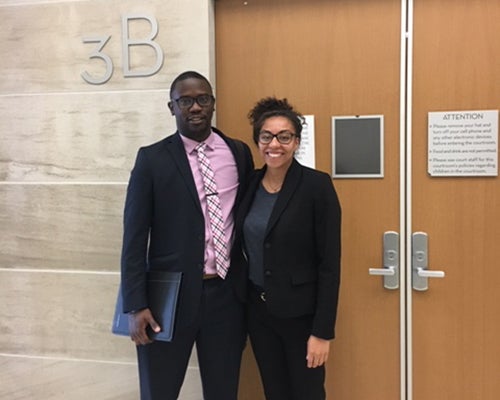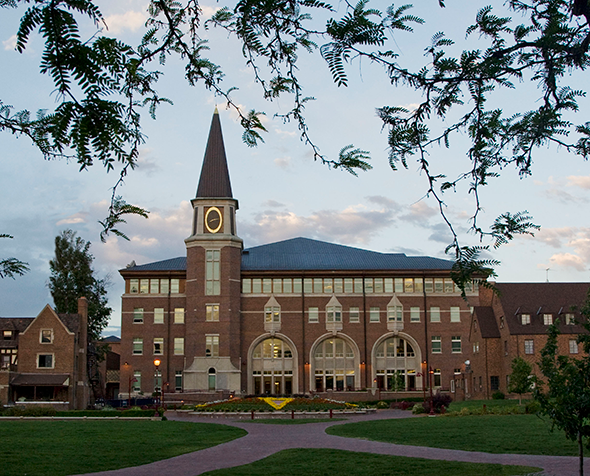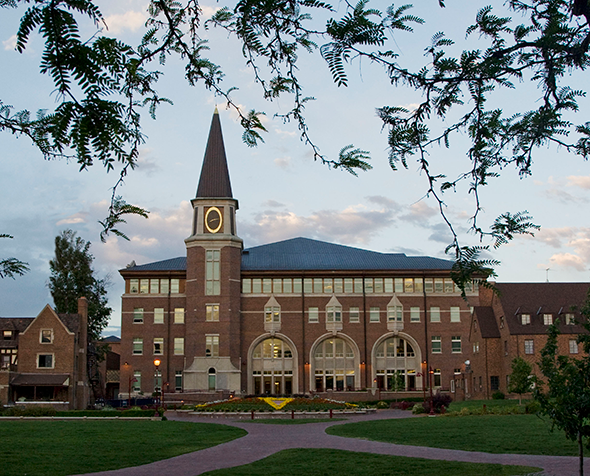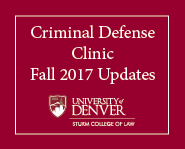Criminal Defense Clinic Fall 2019 Updates & Faculty Highlights
Criminal Defense Clinic students are hard at work, determined to use their platform as lawyers to tell their clients’ stories and zealously resist systemic injustice
After an intensive three-week-long orientation, student attorneys in Denver Law’s Criminal Defense Clinic (CDC) are now in full swing for the Fall 2019 semester. CDC student attorneys practice under the supervision of Professors Robin Walker Sterling and Christopher Lasch, who are entering their ninth year as a teaching team at the University of Denver. Clinical Teaching Fellow Sara Hildebrand, a 2012 graduate of the Sturm College of Law and CDC alumnae, joined the teaching team in July bringing her expertise to the clinic.
Student attorneys in the CDC represent low-income juveniles and adults in the Denver metropolitan area and surrounding communities who are accused of misdemeanors and municipal code violations. But the student attorneys don’t stop there—showing their dedication to holistic representation, one team of student attorneys appeared at an employment disciplinary hearing to advocate for their client, who faces a sanction up to termination of employment due to the allegations in his pending criminal case.
CDC students cultivate trusting attorney-client relationships through thoughtful, client-centered lawyering, using fact-rich narrative to humanize their clients to opposing counsel and the court. Through their work in the clinic, students also hone their legal research, writing and courtroom skills. Perhaps most importantly, through the countless hours they spend with their clients, CDC students develop a personal sense of injustice as they experience the ways their clients are marginalized because of race, poverty, or other disadvantage, in a system that does not adequately support those with mental health and/or substance abuse issues.
3L Denver Law students (l-r) Nyahuma Egerton-Francis and McKenna Newsum-Schoenberg at the Denver County Courthouse.
CDC clients often have needs that fall outside the scope of their criminal cases. Jasmine Johnson, a graduate student in the University of Denver School of Social Work, makes an invaluable contribution to our holistic approach. She partners with CDC student attorneys to help clients find needed community resources such as convenient and affordable drug treatment, and low-income housing.
If a CDC client is concerned about potential immigration consequences, their defenders have the support of student attorneys in the law school’s recently established Immigration Law and Policy Clinic (ILPC), now in its second year at the Sturm College of Law. ILPC students help CDC students to thoroughly advise their clients about the potential immigration consequences arising from their criminal case.
This semester we also have seven experienced criminal defenders re-enrolled in the CDC for a second or third semester. These students defend clients, engage in efforts to alleviate the collateral consequences of conviction for their clients by advocating for criminal record sealing and/or record expungement, and assist first-semester CDC students through case workshops. Additionally, the CDC II/III class is working with a community partner on an important policy project aimed at reducing the prison population in Colorado.
In a time when the United States has more people who have lost their liberty and are behind jail and prison bars than any other country in the world, Criminal Defense Clinic students are hard at work, determined to use their platform as lawyers to tell their clients’ stories and zealously resist systemic injustice.
Criminal Defense Clinic Faculty Highlights
Professor Christopher Lasch
“Sanctuary’ as Civil Rights Discourse.” Seminario internacionale: “‘crInmigración’: control de la inmigración y Derecho penal en perspectiva comparada.” Universidad Complutense. Madrid, Spain (Dec. 11, 2018).
“Cities as Havens: The Evolution of Sanctuary Policies.” (Panelist). Symposium: “Remodeling Sanctuary: Urban Immigration in a New Era.” Fordham University School of Law. New York, NY (Nov. 9, 2018).
“Sanctuary’ Values.” (Panelist.) Association of American Law Schools 2019 Annual Conference, Section on Immigration: “Immigration Values.” New Orleans, LA (Jan. 5, 2019).
“A common-law privilege to prevent immigration courthouse arrests.” (Panelist.) American Bar Association 2019 Midyear Meeting, Criminal Justice Section: “Putting ICE on ice.” Las Vegas, NV (Jan. 25, 2019).
Brief Amici Curiae of Legal Scholars in Support of Defendants' Motion to Dismiss Counts 1-3 of the Indictment, United States v. Judge Shelley Joseph, No. 19-cr-10141 (D. Mass. Sep. 13, 2019) (with Seth Davis and P. Sabin Willett) (arguing that prosecution of state-court judge—for allegedly obstructing justice and obstructing a federal proceeding, because she permitted defendant in state-court criminal proceedings to depart from state courthouse so as not to be arrested by federal immigration officials—violates the Tenth Amendment and is part of a trend of federal Executive overreach characterized by efforts to enlist and coopt state criminal systems in the service of federal immigration enforcement).
“The sanctuary lens: Seeing the values that shape our debates over sanctuary.” (Panelist.) University of California San Diego, United States Immigration Policy Section: “Immigration Politics & Policy in the Age of Trump.” San Diego, CA (Apr. 17, 2019).
Oral Testimony, “Protect Colorado Residents From Federal Government Overreach,” H.B. 19-1124, 72nd Gen. Assem. (Colo. Mar. 28, 2019), available here, (testimony is from 2:15:05 – 2:18:20).
Brief of Law Professors and National Immigrant Justice Center as Amici Curiae in Support of Respondents, Rodrigo Esparza, et al. v. Nobles Cnty., et al., No. A18-2011 (Minn. App. Mar. 13, 2019) (with Mark Fleming and Katherine Melloy Goettel) (arguing that arrest by state law enforcement officers based on detainer and administrative warrant issued by federal immigration officials, and/or detention pursuant to intergovernmental services agreement (IGSA) lacked authority under state law and Immigration and Nationality Act).
“Oregon Lawsuit Challenges State, Local Participation in Immigration Enforcement.” (with Mark Fleming, National Immigrant Justice Center). CRIMMIGRATION (Jan. 9, 2018).
“Sanctuary Cities and Protecting Immigrants and Refugees.” (Panelist). University of Minnesota Law School, Immigration Law Forum, “Civil Rights Behind Bars.” Minneapolis, MN (Nov. 2, 2018).
Associate Professor Robin Walker Sterling
Publications
Invisible Injustice: A Review of Punishment Without Crime: How Our Massive Misdemeanor System Traps the Innocent and Makes America More Unequal by Alexandra Natapoff, Journal of Community Psychology (forthcoming 2020).
Presentations
Presenter, Raising Race, Multi-Track Federal Criminal Defense Seminar, Federal Defender Services Office, Administrative Office of the United States Courts Training Division, Denver, CO (August 16, 2019).
Co-Presenter (with Profs. Brad Colbert, Perry Moriearty, Rachel Moran, And Carl Warren), Learning About The Forest By Examining The Trees: Discussing Systemic Concerns In The Context Of Direct Client Representation, Association of American Law Schools, 2019 Conference On Clinical Legal Education, San Francisco, CA (May, 5, 2019).
Co-Presenter (With Profs. M. Eve Hanan (UNLV, Boyd School of Law), Rachel Moran (University of St. Thomas School of Law), and Anne Traum (UNLV, Boyd School of Law), Webinar, Teaching Justice Through Misdemeanor Defense, Clinical Legal Education Association, Denver, CO (April 9, 2019).
Presenter, Implicit Bias and Talking About Race Issues In Voir Dire, Training, Office of the Colorado Public Defender, Denver, CO, (April 23, 2019).
Presenter, A New System of Juvenile Justice, Constitutional Law Workshop, University of Maryland School of Law, Baltimore, MD (March 8, 2019).
Panelist, “Maintaining Your Client’s Humanity In The Criminal Justice System,” In Pursuit of a More Perfect Union: DU’s Inaugural Civil Rights Summit, University of Denver Sturm College of Law, Denver, CO (February 15, 2019).






